This project is made possible through the partnership of WATER CHARITY and the NATIONAL PEACE CORPS ASSOCIATION. ![]()
This project has been completed. Please scroll down to read about the conclusion.
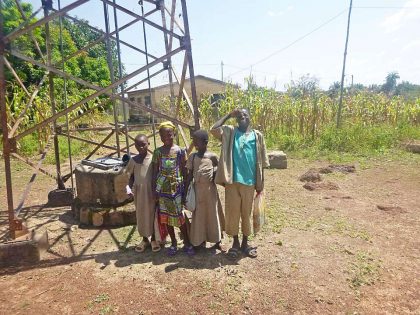 Location
Location
Kpaza, Centrale, Togo, West Africa
Community Description
Kpaza, a predominantly Muslim community of 2,100 inhabitants with a surrounding population of 800, is situated roughly 50kms northeast of Sokodé in low-lying rocky hills within the Atokora range. Kpaza is a community of subsistence-level farmers cultivating the usual array of crops for Togo: maize, manioc, beans, and soya. There is some cultivation of cashew nut which has become an important, albeit small-scale cash crop. Molla, sedentary Fulani and Kotokoli are the dominant ethnic groups and Islam the religion practiced by all the community members.
The seasonal water table is higher in Kpaza than the surrounding localities thus providing some measure of water security throughout the year including the dry season as most of the open wells have water at depths of 8 to 10 meters. The water quality is assumed to be of the same unpotable quality as elsewhere in Centrale. The shallow subsurface (lateritic) zone is easily contaminated by shallow, lateral flow from latrines and other buried waste, polluted streams and rivers, and infiltration of surface contamination (particularly fecal). There are three borehole wells in Kpaza though the depths are not known as these are enclosed wells.
The health clinic was first built in 1987 without a water source, and in 1994 three additional rooms were built. Electric power was added much later. In 1989 an open well was dug. In 1999, Plan International equipped the well with a 4-meter-high metal water tower, a hand pump, and indoor plumbing whereby water was hand-cranked to the metal water tank and subsequently routed into the clinic by gravity feed. The hand pump broke shortly after and was never repaired. Subsequently, the clinic staff, patients, and nearby residents have been fetching water manually now for nearly two decades. The clinic treats an average of about 90 patients per month and roughly 7 births. The clinic has only two staff, the head nurse ( a state employee) and the midwife who is paid by the community. In 2011, a Togolese NGO built an incinerator and cistern to store the ashes. The center overall is very clean and there are several underground cement “tanks “used to store blood and tissue waste, and when running water was available discharged from the indoor plumbing.
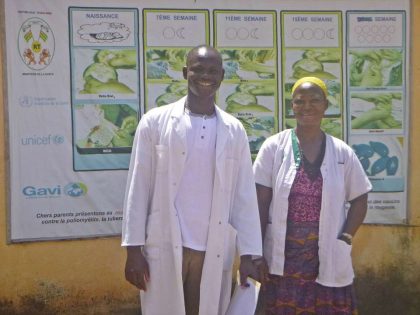 Problem Addressed
Problem Addressed
While water appears to be available year-round at the clinic well, the water is unhygienic due to the open nature of the well, its shallow groundwater source, and the use of community buckets. In addition, the lack of running water inside the clinic requires the patients, relatives, and staff to transport water manually into the clinic whereby water is stored in open containers. While water for consumption is treated with bleach, water used for cleaning of surfaces is not treated. The lack of running water is a serious problem for both the clinic staff and the patients, particularly pregnant women and their female relatives, the latter who are required to fetch water during and post-birth for cleanup and consumption. The lack of running water, floor drains, and delivery room discharge vents are particularly onerous for the midwife who at present hand-carries blood and tissue in basins to a pit outside the clinic, thus posing a serious threat to both the midwife and the community, in general, should a patient carry a contagious blood disease.
Project Description
This project is to build a borehole well for the clinic. Under the guidance of the Department of Hydraulics and Sanitation’s regional office in Sokodé and with support from the Ministry of Health regional director, who identified clinics with the most critical need, and a local drilling company, this project proposes to drill a 60- to 100-meter borehole well at the clinic, equipped with the following:
• An electric submersible pump
• a 4.5-meter high cement block water tower (we will use the existing metal water towers which will be reinforced to support new water tanks)
• a 2 meter*3 polyethylene tank
• piping to the main intake valve at the clinic
The submersible pump will be run using electricity. The local drilling company selected, Plomberie Génerale de Réalisation de Forage, in operation since 1998 and based in Tchamba, has extensive experience drilling deep borehole wells throughout Togo and regionally in Burkina Faso, Benin, and Nigeria.
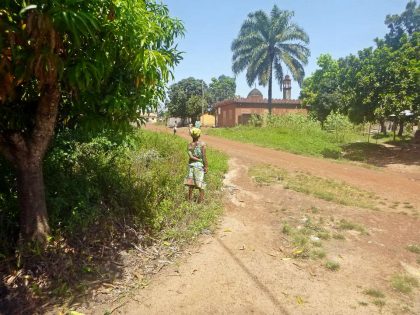 Project Impact
Project Impact
Number of people affected by the project: 3,000
Project Administration
This project will be managed by Anne Jeton, hydrologist and Returned Peace Corps Volunteer (RPCV), Burkina Faso (’82-’85) and Returned Peace Corps Response Volunteer (RPCRV), Togo (’16 -’17). Anne was sent to Togo on behalf of Water Charity to develop and administer new projects, and to coordinate with the Peace Corps.
Monitoring and Maintenance
Along with staff from the Department of Hydraulics and Sanitation who will monitor the well “indefinitely” (the well data becomes part of the official borehole well database, and as such is included in periodic field monitoring by technicians based in each Prefecture ), the contract for well drilling states a one-year guarantee provided by the drilling company. Problems with pump and borehole functioning are typically resolved in the first month of use.
Proper screening of the borehole and submersible pump placement relative to the static water table often mitigates the most common problems. However, any mechanical problems surfacing in the first year will be the responsibility of the drilling company.
The clinic staff will be responsible for maintaining a well repair account which will be funded from the sale of medicines. The clinic will decide a nominal fee for water use should the water account be insufficient, or the community will be asked to contribute directly to the costs.
Project Funding
Funds for this project have been advanced by an anonymous donor. Please Donate using this button to contribute to our work in Togo.
 Conclusion of Kpaza Clinic Borehole Water System Project – Togo
Conclusion of Kpaza Clinic Borehole Water System Project – Togo
This project was managed by Anne Jeton, hydrologist and Returned Peace Corps Volunteer (RPCV), Burkina Faso (’82-’85) and Returned Peace Corps Response Volunteer (RPCRV), Togo (’16 -’17).
Project Name: Kpaza Health Clinic Borehole Well Water System, Centrale Region, Togo
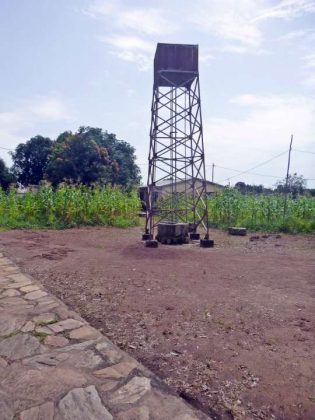 The purpose of the borehole water system project at the Kpaza health clinic was to address a lack of both potable and year-round water, either the absence of or nonfunctioning indoor plumbing and the lack of hygienic disposal of afterbirth blood and tissue.
The purpose of the borehole water system project at the Kpaza health clinic was to address a lack of both potable and year-round water, either the absence of or nonfunctioning indoor plumbing and the lack of hygienic disposal of afterbirth blood and tissue.
The maternity delivery room was equipped with a sink, faucet and running, potable water, and through additional outside funding; a floor drain and a discharge chamber, both plumbed to a dedicated subsurface cement-lined and ventilated septic tank. Delivery room waste (blood and tissue) can now be dispensed with directly in the maternity room in a safe and hygienic manner, rather than hand-carried by the midwives to an outdoor pit or in many cases poured into the latrines.
Following borehole drilling, a “pump test” was run to determine the well’s productivity and in turn the hydraulic properties of the aquifer. The pump was run for several hours at a rate like actual use and the declining water table (drawdown) was measured at regular intervals. The Kpaza borehole was drilled to a depth of 59 meters has a yield of 1,500 liters/hour which is more than adequate to supply both the clinic needs and those of the surrounding households. The pump test also indicated a rapid refilling of the borehole, implying even when run at the maximum yield rate, the well should recover quickly and not result in significant lag times. Simply put, the hydraulic conditions of the well are favorable to ensure a sustainable water supply for many years to come (assuming the system is well maintained).
Water samples from both the borehole well and the original clinic well were taken and sent to the Regional laboratory in Sokodé, the regional capital, for a complete microbial and inorganic compound analysis. The results of this analysis indicate zero presence of any of the disease-causing bacteria tested (E Coli, Salmonella, Fecal Streptococci, Enterococci and a general category of thermotolerant Coliforms) in the new borehole well.
Numerous visits were made during the well installation by the Water Charity Coordinator and the government hydrologist to oversee construction and to ensure the clinic and community leaders understood the responsibilities associated with maintaining and ensuring sustainable water supply. A final visit by the Regional Director of hydraulics insured the borehole well and the associated delivery system met all the driller’s contract requirements and functionality.
An official technical opening concluded the project with a presentation by the driller on the borehole well components, brief discourses by the Department of Hydraulics Regional Director, village leaders, the Water Charity coordinator, and a representative from the regional ministry of health. As the representative for Water Charity and its donor(s), the Coordinator reinforced previously discussed themes of maintenance and upkeep through the active participation of a community water committee and a clinic repair account, to manage public access to the well in a non-disruptive manner to the clinic staff and patients, and most importantly to take responsible ownership of this valuable resource.
CONCLUSION AND IMPACT: 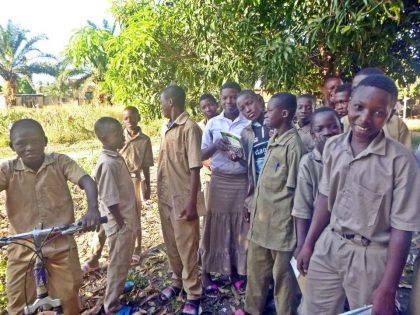
The Kpaza clinic serves a population of approximately 3,000 people, including the neighboring villages, who will directly benefit from a more hygienic health clinic. While clearly not all 3,000 people living in Kpaza will be accessing the well water for personal consumption, the community development liaison estimated perhaps as many as 1,000 inhabitants may utilize the community access points. Given the high quality of water at the clinic borehole well, the number of water users may be more numerous than previously estimated as many water sources in the village while year-round are much less potable.
The clinic anticipates seeing a rise in births as there is now running water and female relatives are no longer obliged to fetch water for the patient, in addition to an overall improvement in hygiene. The clinic staff will use access to potable water to encourage better overall hygiene, as most of the disease-causing bacteria in the community water sources are due to fecal transmission by both animals and humans. The clinic staff, particularly the midwives and their assistants (which often include female relatives) will be better protected against blood-borne diseases as afterbirth material (blood and tissue) will be dispensed in a rapid and efficient manner, significantly reducing exposure.
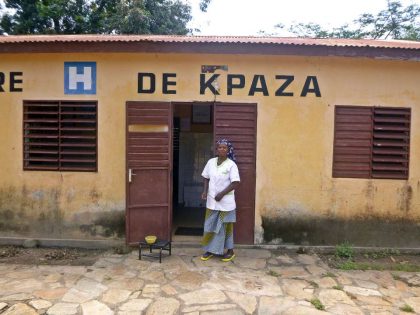 The Regional Director of the Department of Hydraulics stated in his technical report the Kpaza health clinic borehole well water system has fully succeeded in meeting both the local and national objectives for potable water. The Department of Hydraulics, the Ministry of Health and staff at each rural health clinic served by this project have repeatedly been astounded at the expediency with which funding was made available thus allowing work to begin within weeks of submitting the project request. Thank you, donors and Water Charity!
The Regional Director of the Department of Hydraulics stated in his technical report the Kpaza health clinic borehole well water system has fully succeeded in meeting both the local and national objectives for potable water. The Department of Hydraulics, the Ministry of Health and staff at each rural health clinic served by this project have repeatedly been astounded at the expediency with which funding was made available thus allowing work to begin within weeks of submitting the project request. Thank you, donors and Water Charity!
The efficiency of work that followed was due in large part to the incredible efficiency, planning, and hard work by the local drilling company’s crew. The Regional Director and the hydrogeologist at the Department of Hydraulics and Water in Sokodé also contributed their time, vehicle and expertise to ensure all technical aspects of the project conformed to modern standards and have assured their continued presence as the borehole wells are now part of the national water database and monitoring program.
Having the government of Togo involved from the beginning in this suite of health clinic projects, from the selection of health centers to technical oversight and continued monitoring by the Ministry of Water officials, has confirmed the importance of not doing community projects as isolated NGOs. This last point is critical to continued success as most water projects in Togo are implemented without government oversight, leading to a myriad of problems none the least being poor technical implementation and little to no continued oversight.
The Kpaza project was implemented in concert with five other health center water system projects, scattered over two districts – all of which were completed on schedule. The community of Kpaza offers its sincere thanks and gratitude to the donor(s) for this valuable water resource. As they say here “l’eau est la vie”. Water is life, and the cleaner the water the longer and more satisfying life will be! Un grand merci!